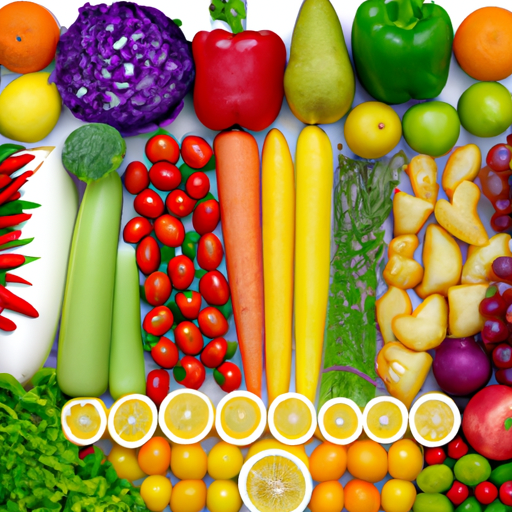Overview of Nutritional Education
Nutrition is an important factor in any child’s life. From ensuring the right combination of nutrients to providing the energy for a growing body and brain, it’s key for any parent to teach their kids about making healthy choices when it comes to food. As such, nutritional education can go a long way in helping children develop healthy eating habits from an early age.
It’s easy to see why nutrition education is so beneficial: teaching kids about the value of vitamins, minerals, fats, proteins and carbs not only creates a basis for developing lifelong healthy habits, but also encourages physical activity, preventive care and avoidance of risks like obesity.
Early intervention is key when it comes to nutrition education – the sooner children learn about healthy diets, the easier it will be for them to make smart choices as they get older.
Factors That Contribute to Poor Nutritional Habits in Kids
When it comes to kids’ eating habits, there’s a whole lotta bad out there. We adults may not like to admit it, but we have the power to influence our kids’ food choices – good or bad. It starts with knowing the reasons why kids gravitate towards unhealthy foods and what we can do to help steer them in the right direction.
Time constraints, convenience, and financial constraints have a large role to play in bad dietary habits in children. Children often rely on pre-packaged snacks, fast food, and processed foods as they are easy to find, fast to make, and require no cooking skills. Parents who don’t have time to prepare balanced meals will often turn to these convenient processed foods as a quick solution, teaching their kids that it’s okay to consume them.

For some families, access to healthier foods is limited due to cost. While processed snacks and fast food may be cheaper, parents can make healthy eating more affordable by purchasing frozen or canned vegetables, choosing produce in season, buying in bulk, and planning ahead.
Finally, kids might feel like they don’t have much control over what they eat. Allowing them to make healthy choices when shopping or cooking can give them a sense of ownership and encourage them to make better decisions.
The Need for Nutritional Education
We all realize the importance of nutrition, but unfortunately, not enough of us are doing enough to make sure our youngsters eat right. Kids already have a lot on their plates, and in today’s digital age, it can be difficult for them to stay away from unhealthy snacks and fast food. Compound that with their busy schedules and it’s easy to see why so many children and teenagers don’t get the nutrition they need.
Nutrition education is essential if we want to put an end to childhood obesity and other health-related issues. Without proper nutrition and dietary habits, there can be serious long-term consequences. It’s up to us to educate kids about healthy eating, portion control, and food labels, before bad habits become second nature.
So what can be done? We must start by teaching our young ones the basics of nutrition. Show them how to read nutrition labels and what the numbers mean, explain what makes up a balanced diet, or why you shouldn’t go overboard on sugary snacks and sodas. Educating kids about healthy nutrition means setting them up for success in the future.
Conclusion: The Benefits of Nutritional Education for Kids
It’s no secret that kids need to make smarter nutritional choices if they want to lead a healthy lifestyle. But what’s the best way to ensure they learn the importance of good nutrition? Nutritional education is key! By proactively teaching them the benefits of good nutrition, parents and educators can help kids form lifelong healthy habits.
Nutritional education comes in many forms. School programs that focus on nutrition are a great start, but it’s equally important for parents to act as role models. Home cooking and meal planning can also help kids develop positive long-term eating habits. With a little guidance, youngsters will be able to make smart nutritional choices that can benefit them throughout their lives.
In conclusion, investing in nutritional education for kids is essential if we want to raise a generation that understands the value of healthy eating. Early intervention is particularly important since children are more likely to follow the examples set by their parents and teachers. So don’t keep putting it off – equip the younger generations with the knowledge and resources they need to fuel their bodies properly.
Nutrition Education FAQs
What is the importance of nutrition and health in the early years?
As someone who’s spent a lifetime studying the intricacies of nutrition and health, I can tell you that the early years are absolutely vital when it comes to instilling healthy habits in our children. The habits we form in childhood will often stick with us for life, and making sure that kids are properly informed about nutrition and wellness is critically important.
Nutrition education for kids is about much more than just learning about what the food pyramid looks like; it’s about teaching them how to make good choices and understand the relationship between food and their bodies. Kids need to understand that what they put into their bodies will have a direct effect on their energy levels and overall health.
Having a good understanding of nutrition is essential for teaching kids how to make healthy decisions. By providing children with nutrition education, we can ensure that they are able to make informed choices about their food, and are informed enough to identify products that offer little nutritional value.
It’s important to remember that nutrition education is not just about what kids eat; it’s also about teaching them the importance of physical activity and exercise, and instilling a sense of responsibility towards their own health. Kids need to be aware of the long-term benefits of good nutrition and how to make healthy lifestyle choices.
If you want to help your child make healthy choices and maintain a healthy weight, nutritional education for kids is a must. Early intervention is key to making sure that your child is informed and equipped to make healthy decisions when it comes to food and nutrition.
What is the importance of nutrition education?
As someone who has seen the effects of poor nutrition on kids firsthand, I can firmly attest that early nutritional education is essential. It’s essential for young people to develop an understanding of healthy eating habits and the importance of whole foods. A balanced approach to nutrition is key to helping kids grow into strong, healthy adults.
Nutritional education can help kids make more informed decisions about what they’re putting into their bodies. It can also empower them to make changes that can have a positive impact on their health. Teaching kids about portion size, nutrient density, and the importance of filling up on fruits and vegetables can help them eat healthier and avoid disease-promoting foods.
Nutrition education is also an important way to tackle the growing issue of childhood obesity. Teaching children about healthy eating habits can shift the focus away from food as a reward or comfort and instead emphasize its importance for physical health. This shift can help to reduce the risk of obesity and other chronic health conditions.
Nutritional education is an important investment that can have a lasting impact on children’s health. An early understanding of healthy eating habits can set kids up for lifelong success.
Why is it important to educate children about nutritional facts *?
As a parent, it’s important to me that my kids know the basics of nutrition. By teaching them early on, we can ensure they develop a healthy relationship with food, as well as develop good habits that will last a lifetime.
Nutritional education can play an integral role in helping our kids grow into healthy adults. Teaching children proper eating habits when they’re young helps them make informed decisions when they’re older. It also gives them the tools to make healthy choices and develop more balanced diets.
Nutrition is more than just about what we put into our bodies; it’s about teaching our children about their overall health. Eating healthy foods is important for physical growth, but understanding why certain foods are beneficial (or detrimental) helps children develop better habits. By introducing different foods, flavors, and textures at an early age, kids will become more in tune with their bodies and better able to discern what is healthy and what isn’t.
Unfortunately, many kids are influenced by marketing from unhealthy food companies. By teaching kids the basics of nutrition and helping them to understand why certain foods are beneficial, we can help them make healthier choices and not just be swayed by advertising. In addition, we can help them understand why eating certain foods can have a positive impact on their health.
Nutritional education can also help kids develop a better understanding of their individual needs and the impact their eating habits have on their overall well-being. This can help them better manage their health and develop better lifestyle choices. Additionally, teaching kids about nutrition early on can help prevent unhealthy weight gain later in life.
Overall, nutritional education is an important step in helping kids lead healthier, more balanced lives. By giving them the knowledge and skills they need to make better choices, we can help set our kids up for success both now and in the future.
nutritional education for kids: the importance of early intervention
As a journalist, I know that nutrition education for young children is essential for their long-term health and wellbeing. Early intervention is key to ensuring that kids make healthy food choices throughout their life.
It’s never too early to teach children the basics of healthy eating. Introducing kids to the principles of healthy eating early on means they’re more likely to absorb that knowledge and apply it to their diet later in life. That’s why it’s so important for parents to start talking about nutrition with their kids early – and continue the conversation as their kids grow older.
Families should help kids understand why certain foods are good for them, and why others are not. Kids need to know that there’s a difference between “treat” foods and everyday staples like vegetables, fruit, and whole grains. Educating kids on the importance of a well-balanced diet will help them develop healthy eating habits. It’s also important to remember that kids have different nutritional needs than adults, so it’s important to tailor their diets accordingly.
In addition to educational resources, it’s important to create an environment in which kids can make healthy food choices. Access to fresh fruits and vegetables, for example, can make it much easier for kids to make the right choice. Kids should also be encouraged to try out a variety of new foods, since this can help to expand their palate and encourage them to make healthy choices in the long-term.
Providing kids with a solid foundation of nutrition education is one of the most important things a parent can do for them. Early intervention not only helps kids develop healthy eating habits, but also gives them the knowledge they need to make informed decisions about their diet throughout their lives.

